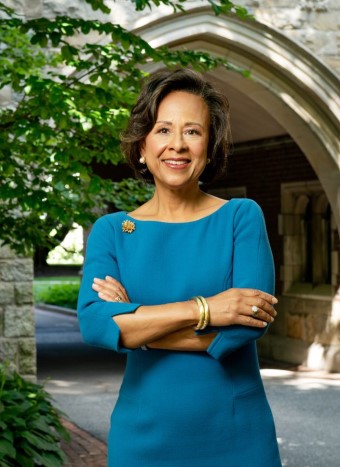
Earlier this year, I had the privilege of honoring groundbreaking artist Lorraine O’Grady ’55 at Wellesley’s Davis Museum, which is hosting her first major career retrospective exhibition. Lorraine’s work is a powerful example of art that inspires us to remake ourselves—and our worlds—without constraints or fear, and in defiance of society’s limiting prejudices and strictures.
As I walked through the exhibition, I found myself thinking about Lorraine’s story (she has led a fascinating life) as well as her time at Wellesley. Then I thought about our current students and all the ways they will tell their stories, and, just as Lorraine has, how they will create new ways of seeing and revitalize how we will serve the ideals of progress.
One of the ways to ensure they can do this lies in our steadfast commitment to a transformative liberal arts education, one that includes access to all that the humanities have to offer. The sciences are critical in that they show us how we exist and make our way in the world. But it’s the humanities that asks all of the “whys” that keep us grounded as a people and give us the ethical frameworks we need to build a just and equitable society.
Now, with the support of a $1.5 million Mellon Foundation grant, Wellesley will reimagine our approach to the humanities, helping even more of our students unlock their own stories.
The grant will fund a multiyear endeavor that will use themes of democracy, environmental justice, and identity to bring the College’s humanities departments together. Called “Transforming Stories, Spaces, Lives: Rethinking Inclusion and Exclusion through the Humanities,” five professors* from three departments will lead the project. Nearly half of all faculty across the humanities have signed on to participate.
The project’s first goal will be to revise our curriculum and courses in ways that will transform the humanities at Wellesley. One possibility is to develop new courses that help students detect and understand AI-generated content as it proliferates, often without notice, across media, disciplines, and industries. Another idea, a collaboration with the Frost Center for the Environment and the Botanic Gardens, would use poetry to spur deeper thinking about environmental justice and identity.
Next, the grant will fund student-faculty research projects in the humanities. Over the life of the grant, this means potentially more than 200 students will gain research experience similar to what students in the sciences enjoy. These research collaborations will be housed in a new humanities hub in Clapp Library, currently under renovation, giving students a dedicated “home base.”
Finally, humanities faculty will connect students with groups external to the College, like nonprofits and community organizations, to show them how the ideas introduced in their courses are being used in real and concrete ways and allow them to participate in public humanities projects. It’s thrilling to imagine how students might use these opportunities to effect change beyond our campus.
At a time when some institutions have reduced funding for the humanities, we should be proud that this grant will allow our incredible faculty not only to make these disciplines more relevant to our students, but to provide them with new opportunities and resources to tell their stories. This is part of how Wellesley is reimagining what the humanities can be—and whom they can serve—in the 21st century.
As Cord Whitaker, associate professor of English and one of the faculty members behind the grant, said, “To be at Wellesley and to use that time well is to be able to understand who you have been in the world, who you are in the world, and who you wish to be in the world. The best way to do that is to try to understand your story even as you are creating it.”
*The grant awardees are:
- Yoon Sun Lee, Anne Pierce Rogers Professor in American Literature and professor of English
- Eve Zimmerman, professor of Japanese
- Cord Whitaker, associate professor of English
- Martha McNamara, director of the New England Arts and Architecture Program and senior lecturer in art history
- Dan Chiasson, Lorraine C. Wang Professor of English



